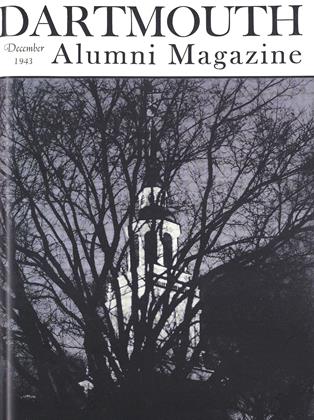MENTION HAS BEEN MADE in these columns of the questionnaire issued some time ago by The New York Times concerning the knowledge of American history possessed by something like 7000 freshmen in American colleges. What it revealed, if the respondents were as honest as the Times assumes, was an abysmal ignorance of that subject; and this has led to a recommendation that the colleges take more seriously their duty to impart a working knowledge of American history, instead of assuming (as they have in the past) that all students get enough of it in the elementary and secondary schools. It is evident that they do not. Hence the argument that American history should be listed among the requirements for an A.B. degree. Benjamin Fine, education editor on the Times staff, points out that many high schools do not require American history, so that it is possible for a student to enter college without it and graduate from college after four years still without it—perhaps with a Phi Beta Kappa key, and high honors in some other course. All this was set forth in the Key Reporter, the Phi Beta Kappa news quarterly, a short time ago.
There are two principal arguments urged against making American history a requirement for the bachelor's degree. One is that the student has already had all he needs of this subject. The validity of this assumption is open to doubt, even without the testimony of the Times questionnaire. The other argument is that making our own country's history a college requirement would impose a course which the student would find dull and boring—as if the same thing were not equally true of a dozen other subjects already required, despite the knowledge that many students regard them as a nuisance to be endured with as little trouble as the student can Contrive.
That a knowledge of American history is imperative to the production of an intelligent citizenship can hardly be denied. If, as now seems probable, it must be admitted that young men are emerging from college without such knowledge, something needs to be done about it. We cannot go on assuming that it is as needless to teach American history in college as it would be to teach the ABC's, or elementary arithmetic, on the theory that of course every one of college age must know all that already. The glaring fact is that comparatively few have more than a vague smattering consciousness of their own country's past, which is a most serious defect. If it isn't made good in college, one has to cure it in later years on his own initiative, as many of us do, by voluntary reading—which most men discover is both interesting and a delight, instead of that colossal bore which one had assumed it must be.
Certain things are required of all candidates for the degree of A.B. which students do not, to say the least, approach with eager zest: but that doesn't operate to ban the requirement from the curriculum. If there is one topic that more than any other seems to be a fundamental requisite for future usefulness, it is a reasonably comprehensive knowledge of the history of one's own country. If students do not already possess it when they enter college—and it is becoming distressingly clear that they do not—they ought to be possessed of it by the time they leave. Mr. Fine concludes that not enough American history is taught and urges that college authorities consider ways and means for remedying this defect. And why should it be a bore? Why insist on the study of the history of other peoples and countries while we neglect our own? If ever any history were dynamic and colorful, our own is. Perhaps the most important effect of the current war will be to awaken us all to the fact.
 View Full Issue
View Full Issue
More From This Issue
-
 Article
ArticleV-12 PHYSICAL TRAINING
December 1943 By C. E. W. -
 Article
ArticleA REPORT ON FINANCES
December 1943 -
 Class Notes
Class Notes1937
December 1943 By JOHN H. DEVLIN JR., FRANCIS T. FENN JR. -
 Article
ArticleEMPLOYMENT FOR ALUMNI
December 1943 By PROF. FRANCIS J. NEEF -
 Class Notes
Class Notes1933
December 1943 By GEORGE F. THERIAULT, LEE W. ECKELS -
 Article
ArticleSHATTUCK OBSERVATORY
December 1943 By L. B. RICHARDSON '00
P. S. M.
-
 Article
ArticleDartmouth as Unusual
November 1942 By P. S. M. -
 Article
ArticleWe Shall Because We Must
May 1943 By P. S. M. -
 Article
ArticleStreamlined Education
October 1943 By P. S. M. -
 Article
ArticleCrime Does Not Pay
November 1944 By P. S. M. -
 Article
ArticleThe Broadening Field
January 1945 By P. S. M. -
 Article
ArticleWe, The People
August 1945 By P. S. M.








